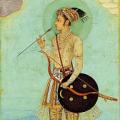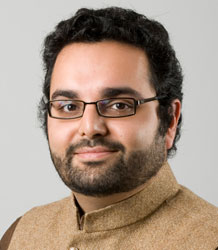188 - Sajjad Rizvi on Mullā Ṣadrā
Posted on
Sajjad Rizvi talks to Peter about Mullā Ṣadrā's views on eternity, God's knowledge and the afterlife.
Themes:
Further Reading
• S. Rizvi, “Process Metaphysics in Islam? Avicenna and Mullā Ṣadrā on Intensification of Being,” in D.C. Reisman (ed.), Before and After Avicenna (Leiden: 2003), 233-47.
• S. Rizvi, Mullā Ṣadrā Shīrāzī: his Life and Works and the Sources for Safavid Philosophy (Oxford: 2007).
• S. Rizvi, Mullā Ṣadrā and Metaphysics: Modulation of Being (London: 2009).
• S. Rizvi, Mullā Ṣadrā and the Later Islamic Philosophical Tradition (Edinburgh: 2013).







Comments
Mulla Sadra
Hi Peter
Is the soul an encyclopaedia with the eye directing it to a particular page?
Roman
Eine seelige Überschneidung?
Hello Peter,
I am currently reading Bryant's translation of the Yoga Sutra of Patañjali (~400 CE) and I was struck by some of the similarities of the Patañjali's theories on the mind and the activities of the soul (namely imagination). While Patañjali would disagree that the soul is pure awareness and therefore cannot imagine, the framework does seem similar. Do you know if the Yoga Sutra would have been available to muslims in Persia? Did yoga disciplines ever exist outside of Moghal India?
Love your podcast!
Micha aus Boston
In reply to Eine seelige Überschneidung? by Micha
Patanjali and Sadra
Interesting. Well as you know from the podcasts (episode 189) there were cases of Muslim authors under the Mughals who took up ideas from classical India, albeit that I don't know if Yoga features much there, I suspect not actually. Or at least if so I didn't run across it. But bear in mind that research into this is in its infancy. I'd be more skeptical of Indian influence on Sadra himself though because he was in Iran, and I haven't seen any mention of Indian ideas filtering into Safavid culture - the direction seems to have been more that ideas went out from Persia to the Ottoman and Mughal realms (largely because of fleeing Sunnis).
In reply to Eine seelige Überschneidung? by Micha
Indian philosophy in Iran
A large number of Sanskrit texts were translated into Persian and Arabic over the various centuries of Muslim rule, and a large number of texts on Ancient Indian thought were produced in those languages by Muslims and Hindus alike untill the late 19th century.
The Amrtakunda, a text on Yoga, survives only in Muslim translations, it appears to have circulated widely in the Islamic world with various translations into Arabic, Persian, Ottoman Literary Turkish and Urdu, with copies being found as far flung as Anatolia and North Africa.
Another work, the Kamarupancasika, was circulating independently in the Persian speaking world prior to the Persian translations of the Amrtakunda. It's mentioned in the fourteenth century encyclopaedia Nafa'is al-Funun of Amuli. The text includes infomation on breath control and 64 Yoginis. 17th century European traveller Pietro della Valla is thought to have obtained a copy of this text of Shi'i scholars in the city of Lar, mentioning a Mulla Shams al-Din Lari, who appear to have been influenced by ancient Indian philosophy.
I should also add here that Al-Biruni made a partial Arabic translation of the Yoga Sutra, though it was considered incomprehensible and doesn't appear to have been widely read.
Translation of Sadra
I'm looking for suggestions of translated editions of Sadra's work into English. The Stanford Encyclopedia gives a few suggestions, but is thin on what seems to be his Major Work, "Asfar" (The Fourth Journey?). It gives a translation of the last volumes:
(2008), al-Hikma al-muta‘aliya fi-l-asfar al-‘aqliyya al-arba‘a, vols. 8 & 9, tr. L. Peerwani as Spiritual Psychology: The Fourth Intellectual Journey (London: ICAS Press).
Do you know of other translations of this or other major works?
Thanks!
In reply to Translation of Sadra by John Anders
Translation of Sadra
Unfortunately we are not well served with translations of Sadra; there is, as far as I know, no translation of the Asfar (the title means "Four Journeys") which is unsurprising since it is huge. A good place to start for him is this:
J.W. Morris (trans.), Mullā Ṣadrā: The Wisdom of the Throne (Princeton: 1981).
In reply to Translation of Sadra by Peter Adamson
Dear Peter, there is a
Dear Peter, there is a partial translation of the Asfar al-arba'a in the edited volume by Seyyed Hossein Nasr, Anthology of Philosophy in Persia (2015) Vol.5, by Majid Fakhri.
Add new comment